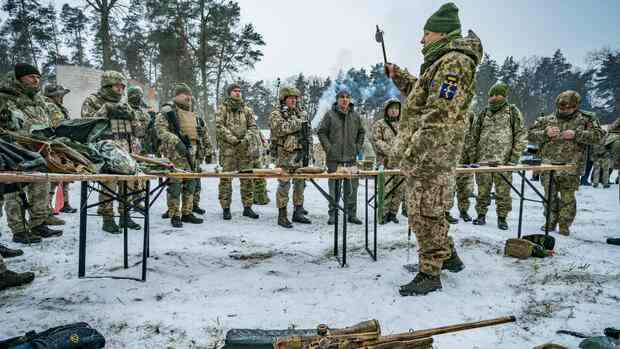Analyzes are circulating in Brussels according to which Ukraine is currently firing 110,000 grenades a month, but would need 300,000 a month to be successful in a counteroffensive.
(Photo: imago images/NurPhoto)
Brussels Concern about the combat effectiveness of the Ukrainian army has reached the highest political level in the EU: led by Estonia, several states are pushing for Ukraine to be supplied with one million artillery shells by the end of the year. The Handelsblatt has a draft of the conclusions for the EU summit next week.
In this, the European Council welcomes “facilitating the immediate provision of ammunition for Ukraine, including through joint procurement, with the aim of providing one million rounds of artillery ammunition by the end of 2023”.
The passage has not yet been finally agreed, the wording could still change before the start of the summit next Thursday. In addition to the Baltics and the Poles, Finland and Romania are also pushing for a concrete delivery promise. France has signaled support. Germany is still considering the pledge, but has already pledged to place “immediate” ammunition orders for Ukraine.
The military situation in Ukraine and the political context are increasingly worrying diplomats in Brussels: If Ukraine doesn’t make a breakthrough by summer at the latest, then probably never, they say. “It’s now or never,” says one diplomat.
Through the partial mobilization, Russia has drafted 300,000 additional soldiers and thereby stabilized the front. The battles of attrition in eastern Ukraine are costly for both warring parties.
Lack of ammunition exacerbates the situation
But while Russia mainly loses recruits, many experienced fighters also die on the Ukrainian side. Doubts are growing within the EU as to whether Ukraine’s planned counter-offensive in the spring and summer will have enough clout to drive the Russians back from the occupied territories.
In order to cover Ukraine’s ammunition needs, the EU states have long been looking outside of Europe, but are encountering reluctance there too.
(Photo: IMAGO/SNA)
The lack of ammunition exacerbates the situation: Ukraine has to ration artillery shells because it fires far more than Europe and the USA can reproduce. At the same time, the supplies of the western armies have shrunk dramatically, so that hardly anything can be delivered from the stocks.
>> Read here: You can find the latest news on developments in the Ukraine war in our news blog
Demands to release more shells from the existing depots are met with increasing resistance from within the European and American armed forces. There is talk of a “huge problem” in Brussels.
Just a few days ago, the German military commissioner Eva Högel (SPD) criticized the sometimes “pathetic” condition of the Bundeswehr and emphasized the “too sluggish” procurement system: “It all takes far too long,” she said.
EU countries are looking outside of Europe
In order to cover Ukraine’s ammunition needs, the EU states have long been looking outside of Europe, but are encountering reluctance there too. South Korea has large reserves of 155mm caliber ammunition, which Ukraine needs for its western-supplied guns. But the country is reluctant to release it, not least because it is threatened by North Korea.
Analyzes are circulating in Brussels according to which Ukraine is currently firing 110,000 grenades a month, but would need 300,000 a month to be successful in a counteroffensive.
In addition to the military situation, the political environment is also becoming increasingly difficult. Within the US Republican Party, the widespread support for Ukraine is increasingly met with criticism.
This is how the Handelsblatt reports on the Ukraine war:
Possible presidential candidate Ron DeSantis, who is believed to have a good chance, described Russia’s war of aggression against Ukraine as a “territorial dispute” that does not represent a “national interest” of the United States. This could embolden the Russian leadership to continue the war despite heavy losses, in order to be in a favorable position after a possible change of power in Washington.
“Ukraine’s upcoming offensive is crucial,” says an EU diplomat. A failure could have dramatic consequences – not only for Ukraine, but also for the security of Europe.
More: How the NATO and EU countries want to help Ukraine with ammunition
